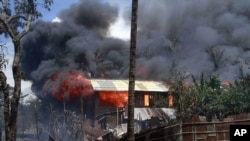GENEVA — The U.N. High Commissioner for Refugees, Antonio Guterres, is offering to help the Burmese government reconcile the Buddhist and Muslim groups in sectarian-torn Rakhine State.
Guterres, who is on a mission to Thailand and Burma, also known as Myanmar, has presented proposals to the Burmese president and other officials for bringing the two communities closer together.
The U.N. refugee agency reports a tense calm has returned to Rakhine State, a remote region in western Burma. In May, violence between Buddhists and Muslims in Rakhine flared after three Muslims were detained following the rape and killing of a Buddhist woman. More than 60 people were killed and thousands of homes destroyed in sectarian clashes that followed.
U.N. refugee spokeswoman Melissa Fleming says the UNHCR continues to view the unstable situation in Rakhine with concern. She says Guterres conveyed these concerns to Burmese officials along with his offers of help.
“We would like to state that in Rakhine State we remain absolutely committed to delivering humanitarian assistance to both populations, the Rakhine and the Muslim without any discrimination," Fleming said. "We believe that this can be a factor for reconciliation -- this aid between the communities -- and we hope that the situation will be established there, with the rule of law prevailing and a human-rights based approach.”
At the peak of the ethnic fighting, hundreds of Rakhine Muslims fled across the Naf River to Bangladesh. Their efforts to seek refuge were frustrated when Bangladesh closed its borders.
Security forces reportedly pushed back refugee boats when they arrived on their territory, leaving hundreds of people adrift in the Naf River.
UNHCR spokeswoman Fleming said the situation of people fleeing across the border is no longer acute.
“We are absolutely monitoring this and hopeful that things will return back to normal and that relations between the two communities can be re-established," she said. "But, one of the festering problems is, of course, the statelessness situation, As the nationality law stands, it is based on ethnicity and it does exclude certain groups including the Muslim Rohingya population.”
Fleming says the UNHCR believes nationality should be granted to members of the Muslim community who are entitled to have it according to the present legislation. And, others, she says should receive a legal status that would grant them the rights required to develop a normal life in the country.
On another issue, she says Guterres asked Burmese officials to clarify why 10 local U.N. and non-governmental aid workers were arrested last month, allegedly on criminal charges. The high commissioner also asked for access to three UNHCR staff being detained.
Guterres, who is on a mission to Thailand and Burma, also known as Myanmar, has presented proposals to the Burmese president and other officials for bringing the two communities closer together.
The U.N. refugee agency reports a tense calm has returned to Rakhine State, a remote region in western Burma. In May, violence between Buddhists and Muslims in Rakhine flared after three Muslims were detained following the rape and killing of a Buddhist woman. More than 60 people were killed and thousands of homes destroyed in sectarian clashes that followed.
U.N. refugee spokeswoman Melissa Fleming says the UNHCR continues to view the unstable situation in Rakhine with concern. She says Guterres conveyed these concerns to Burmese officials along with his offers of help.
“We would like to state that in Rakhine State we remain absolutely committed to delivering humanitarian assistance to both populations, the Rakhine and the Muslim without any discrimination," Fleming said. "We believe that this can be a factor for reconciliation -- this aid between the communities -- and we hope that the situation will be established there, with the rule of law prevailing and a human-rights based approach.”
At the peak of the ethnic fighting, hundreds of Rakhine Muslims fled across the Naf River to Bangladesh. Their efforts to seek refuge were frustrated when Bangladesh closed its borders.
Security forces reportedly pushed back refugee boats when they arrived on their territory, leaving hundreds of people adrift in the Naf River.
UNHCR spokeswoman Fleming said the situation of people fleeing across the border is no longer acute.
“We are absolutely monitoring this and hopeful that things will return back to normal and that relations between the two communities can be re-established," she said. "But, one of the festering problems is, of course, the statelessness situation, As the nationality law stands, it is based on ethnicity and it does exclude certain groups including the Muslim Rohingya population.”
Fleming says the UNHCR believes nationality should be granted to members of the Muslim community who are entitled to have it according to the present legislation. And, others, she says should receive a legal status that would grant them the rights required to develop a normal life in the country.
On another issue, she says Guterres asked Burmese officials to clarify why 10 local U.N. and non-governmental aid workers were arrested last month, allegedly on criminal charges. The high commissioner also asked for access to three UNHCR staff being detained.




